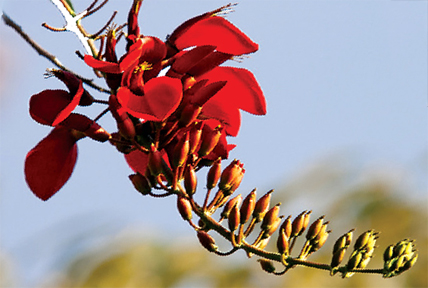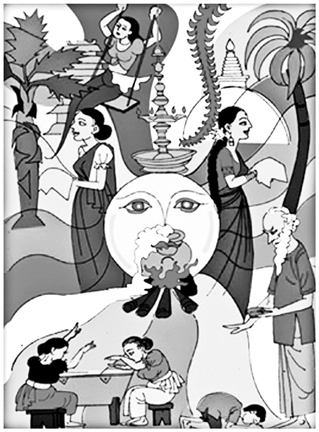Who stole the New Year?
“In those
vernal seasons of the year, when the air is calm and pleasant, it were
an injury and sullenness against Nature not to go out and see her riches
and partake in her rejoicing with heaven and earth.”
- John Milton (1608-1674)
English Epic Poet.
By Kalakeerthi Edwin Ariyadasa
 Children, in some western cultures are at times troubled by a horrid
nightmare: what if someone were to Steal Christmas? That kind of scare
can grip the innocent child-mind, in proportion to the hopes and
aspirations that keep on getting built up, from their earliest days on,
about the promise of Christmas. They are made to believe, that Christmas
arrives with all the good things a child can yearn for. Children, in some western cultures are at times troubled by a horrid
nightmare: what if someone were to Steal Christmas? That kind of scare
can grip the innocent child-mind, in proportion to the hopes and
aspirations that keep on getting built up, from their earliest days on,
about the promise of Christmas. They are made to believe, that Christmas
arrives with all the good things a child can yearn for.
The adult world fosters these incipient fantasies, with the stories
and fairy-tales they so enticingly weave, for those innocent souls. But,
over the ages Christmas has continued unstolen – fortunately and
especially for children.In our culture too, children are made to look
forward to the wondrous days of the New Year festival. As children,
growing up in the village we never experienced nightmares about the
possibility the Sinhala New Year being stolen.
Missed
But, we kept on counting the passing days, lest we missed the New
Year when it dawned.
In those far off days a variety of natural occurrences served as the
harbingers of the festive season, that we so eagerly awaited.
In the rural setting, where we began our life’s journey about nine
decades ago the internal social communications arrangements were not
affected that much by print or electronic media – not to say anything
about the digital modes that are currently ubiquitous.
Nature’s audio – visual signals kept us informed of the approaching
New Year. The deep scarlet blossoms of the Erabadu Tree were the
visually impactful early envoys of the Prince of New Year, who was on
his way as the elders would assure us.
Of the many warblers, the cuckoo was the foremost messenger. Even we
children could identify its, keen, sharp and cadenced notes, as the
alluring song of the New Year.
Though my childhood village was not located that much in-land we had
a whole range of strange winged visitors. There was, of course, the
flamboyant paradise bird, trailing its multi-hued long tail. Some
varieties of this species, had entirely white or yellow tails.
The villagers, whatever their level of affluence, got ready to meet
the New Year. The men-folk would induce the ripening of raw bananas,
through a mechanism of smoke – infusion. The ladies set about preparing
a whole range of New Year sweetmeats – kevum, kokis atirasa being
foremost among them.
Auspicious
Relatives begin to arrive from far and near-ahead of the auspicious
hours.
 The masses, as they went about their traditional folk-ways during the
New Year season, were close to Nature. The masses, as they went about their traditional folk-ways during the
New Year season, were close to Nature.
I introduced this seemingly nostalgic preamble to pose the rhetorical
question – who stole the traditional Sinhala New Year?
When we really come to think about it, we have torn asunder the
intimate ties, we had with our sheltering and protective Nature.
The Sinhala New Year Festival which was absolutely a celebration of
Nature, has now taken on the guise of yet another routine holiday, in
the working calendar. The original significance of this annual
occurrence has almost totally faded from the memory of many in Sri
Lanka.
In Sri Lankan Society the involvement in the mandatory rites and
rituals of the New Year Festival was profound and ardent.
The elderly folk in the villages, will insist on their proper
performance. The observance of the exact auspicious hours was
scrupulously adhered to.
All these performances and observances were effected, simultaneously,
right across the total community, however far-flung it could be. This
togetherness imparted a stabilising effect on the whole human groups.
This way, New Year celebrations acquired the stature of an
irreducible component of our culture. This is one specific area we could
point to when we talk about our own cultural identity.
But, as things are today, most men and women in our land seemed to be
pathetically alienated from this wholesome cultural tradition specific
to us.
Celebrations
Currently, Sri Lanka’s New Year celebrations are not at all a part of
our living, vibrant and pulsating culture. They have deteriorated into a
routine level. In such a context, there is no effort on the part of
many, to explore the origins of our New Year celebrations and the deep
implications of such New Year rites and rituals as the anointing,
rekindling of the hearth, initiating work etc.
The variegated New Year cuisine for the Sri Lankans, the range of
indoor and outdoor games associated with the celebrations, collective
and communal entertainments are all areas that are swiftly dwindling
into decay and subsequent irretrievable oblivious.Strangely enough,
whatever remains from these age-old celebrations are kept alive and even
peripherally sustained by commercial interests.But, this year around a
praiseworthy initiative has emerged. Some educational institutions have
introduced programmes to bring about inter-cultural amity and
understanding, by re-creating in their places of education, Sinhala New
Year Rites and rituals, along with their Hindu counterparts. This will
invariably lead to various communities appreciating the New Year
celebrations of each other.
Values
In our Indigenous culture the New Year Celebrations have, for quite a
long while, been the breeding ground of moral values, ethical behaviour,
deference for each other’s way of life, and general behavioural
discipline.It is upto us therefore, to safeguard our New Year
Celebrations, wholesome and functional urges, that will ensure friendly
and harmonious co-existence among all communities.
Happy New Year to all |

